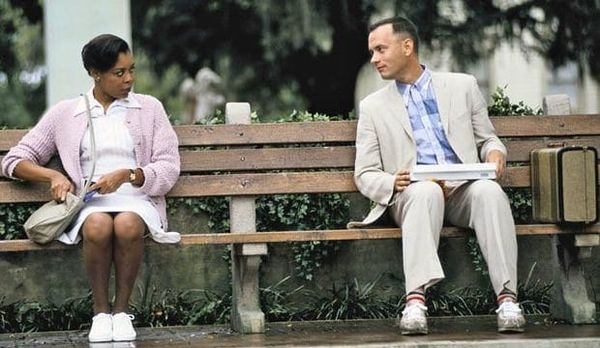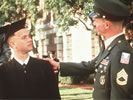Eye For Film >> Movies >> Forrest Gump (1994) Film Review

An Oscar-winner and multi-million dollar earner, Forrest Gump is a fable that covers a lot of ground without feeling the earth beneath its feet.
The secret is conviction. Director Robert Zemeckis and the-man-who-can-be-anyone Tom Hanks are deadly serious. Even Gary Sinise, as Forrest's lieutenant in Vietnam, performs a parody of Tom Cruise in Born On The Fourth Of July without recognising the irony.

The film's appeal is ingrained in a culture that spawned Norman Rockwell and Jonathan Livingston Seagull. Sentimentality is part of it and so is the sense of self, roots, continuity. In Frank Capra's day, the hero was simple, good and true. Forrest is simple, good and true alright, but he's also clumsy and childlike, incapable of understanding sex or politics. Whether his crippled state of mind represents America's tattered prestige is open for discussion.
Dustin Hoffman in Rain Man had things he could do, things he was brilliant at, such as mathematics. It gave him value and purpose in a country that worships winners. Forrest goes further. In his youth, his back is "as crooked as a politician" and he wears callipers. One day, being chased by school bullies, the metal falls from his legs and he runs like the wind. It's a miracle. The first of many.
His life is a legend, lifting the hearts of the maladjusted. He becomes an all-American football star, a Vietnam war hero, plays table tennis for his nation and makes a tidy sum as a shrimp boat captain.
"My name is Forrest Gump," he tells anyone who will listen. "People call me Forrest Gump."
First rule of marketing. Name recognition.
The man is mentally retarded and yet shakes hands with presidents. If a goof like Gump can use the White House bathroom (signed photo of Marilyn by the sink - nice one, Jack) and pull his pants down in public to show LBJ the wound on his "but-tock", so can you. And you.
Although based on Winston Groom's novel, the film has all the hallmarks of a strip cartoon. Forrest is Everyman, who goes everywhere. A potted history of the United States, post-Mamie, pre-Hillary, passes Forrest's confused eye. Often he is there, Zelig-like, at the centre of famous events, while his childhood sweetheart, Jenny (Robin Wright), is dropping acid, marching for peace or chilling on coke, before cutting her hair, joining the one parent fellowship and coming home.
The idiot-as-wise-man scenario is so simplistic it howls in the vacuum of a defunct intellect.
"I'm not a smart man," Forrest says, "but I know what love is."
Every button is pushed, every mushy pink nipple squeezed, every tearduct cleared. Hanks turns into a cuddlesome bunny and almost chokes on the word "choc-o-lates." Those who can repress their mothering instincts long enough to question the morality of making a movie like this about the wonderful world of mental disability might feel aggrieved at its wholesome promise.
Reviewed on: 14 Nov 2001


















